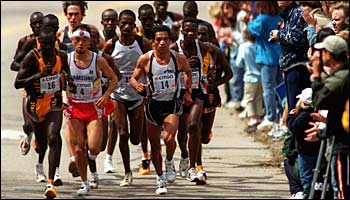|
2002 BOSTON MARATHON / ELITE MEN
Making a run at Kenyans By Joe Burris, Globe Staff, 4/12/2002 Even with its 10-year Boston Marathon men's winning streak snapped, Kenya dominated last year's race with eight finishers in the top 20, far more than any other country. Quick question: Which country was second with three top-20 finishers?
If you answered Ethiopia, Korea, or Ecuador, you're wrong -- and a group of up-and-coming runners from South Africa would like to have a word with you. As a group, they have been steadily establishing their presence at Boston: seventh and ninth-place finishers last year, seventh and 14th-place finishers in 2000, third and fourth-place finishers in 1999. But the South Africans know you really make your mark here by coming across the finish line first. This year's contingent, one of the country's strongest, is primed to do just that. On Monday, watch out for four runners who could give RSA its first men's elite winner at Boston: Laban Nkete of Port Elizabeth, who has had consecutive seventh-place finishes; Makhosonke Fika of Cape Town, who finished 14th in 2000 and led part of last year's race with countryman Simon Mpholo but finished ninth and later complained of thirst after his nearsightedness hindered him from seeing the water stations; Motsehi Moeketsana of Colleen Glen, who finished 18th last year; and Abner Chipu, who finished fourth in 1999. Moeketsana has trained so well that Mpholo, who finished 34th last year, has forsaken an opportunity to come with the team so Moeketsana could run. "When we came in 1999, and Abner finished fourth, there were some discussions that took place about more South Africans coming with a view to give guys experience and opportunities," said Alec Riddle, founder, coach, and manager of Max Africa, a training center that aims to recruit, develop, and train the nation's unheralded talents. Riddle, a 20-year coach and commentator who once trained Colleen De Reuck, began the training center three years ago in Port Elizabeth. Nkete joined his group after seeking advice for running a marathon. Fika joined after looking to improve his chances for running overseas. Riddle recruited Chipu after watching him race in South Africa's National Cross Country Championships in 1998. Moeketsana was referred to him by 1993 Berlin Marathon winner Xolile Yawa. "We try to recruit from young and raw talent rather than established athletes," Riddle said. "We look for runners who are not already there. We hope to take them from out of nowhere to somewhere. This is the third year we've come as a group." The efforts have steadily paid off. Chipu is a half-marathon great, winning the South African Half Marathon last July and then the Great Scottish Run Half Marathon in August. Fika won the 2001 Cape Town Half Marathon in March. He made his marathon debut in Paris in 1999, finishing eighth with a time of 2:10:39. Moeketsana entered the Max Africa camp running the half-marathon in 64 minutes. He's now down to 62.22. Not that South Africa hasn't made an impact on the international marathon scene before. The country can boast one accomplishment the Kenyans cannot: an Olympic gold medal in the marathon, won by Josiah Thugwane in 1996. "It was a real inspiration for us, and eye opener for us that one of us can do that. If he can, then we can do that," said Nkete, who, along with his countrymen, made it clear they are more focused on the Boston field in general than on trying to eclipse Kenya's dominance. Asked what he believes his country's runners need to do to reach Kenya's level, Nkete said proudly, "We're already there." He and Riddle pointed to, among other races, South Africa's team gold medal triumph in the 1998 and 1999 World Half Marathon Championships. Riddle pointed to last November's Eikiden International Relay in Japan, a 20-nation marathon event run by five-person teams. The South African squad overtook the Kenyans on the last lap to triumph. That success has come despite the fact that the South Africans have only recently begun to train in high altitudes. Moeketsana trained for Boston last year in and around the mostly flat city of Bloemfontein. This year, the training regimen has changed. The group did most of its training in Lesotho, a much hillier nation that is surrounded by South Africa. "Most of the training levels in South Africa altitude areas are 1,500 meters above sea level," said Riddle. "In Lesotho you can go as high as 3,000. We trained in a place that is 2,200 meters, which is absolutely ideal." There are other hurdles. "There's a tremendous amount of talent in South Africa, but it's getting the guys overseas for the opportunity to race," said Riddle. He said the group relies heavily on sponsorship from companies such as New Balance. That and the efforts of John Hancock help provide opportunities for athletes who hail from a country where local sponsorship is paltry. "It's not smooth sailing in South Africa this year," he said. "Our South African Marathon championships were cancelled and there's talk that the half-marathon will be canceled, too. No sponsors." They are hoping that another impressive finish here will change that. "You don't get much marketing in athletics [running] in South Africa," said Nkete. "One thing we're trying to do is to market athletics to the people." This story ran on page F4 of the Boston Globe on 4/12/2002. � Copyright 2002 Globe Newspaper Company. |
||||||
